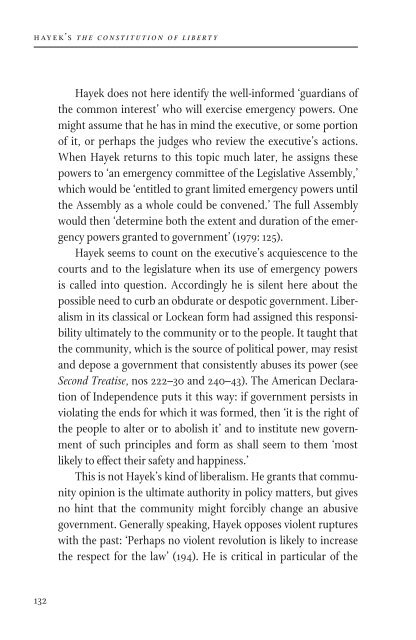Hayek's The Constitution of Liberty - Institute of Economic Affairs
Hayek's The Constitution of Liberty - Institute of Economic Affairs
Hayek's The Constitution of Liberty - Institute of Economic Affairs
Create successful ePaper yourself
Turn your PDF publications into a flip-book with our unique Google optimized e-Paper software.
h ay e k ’ s t h e c o n s t i t u t i o n o f l i b e r t y<br />
r e q u i r e m e n t s o f t h e r u l e o f l aw<br />
Hayek does not here identify the well-informed ‘guardians <strong>of</strong><br />
the common interest’ who will exercise emergency powers. One<br />
might assume that he has in mind the executive, or some portion<br />
<strong>of</strong> it, or perhaps the judges who review the executive’s actions.<br />
When Hayek returns to this topic much later, he assigns these<br />
powers to ‘an emergency committee <strong>of</strong> the Legislative Assembly,’<br />
which would be ‘entitled to grant limited emergency powers until<br />
the Assembly as a whole could be convened.’ <strong>The</strong> full Assembly<br />
would then ‘determine both the extent and duration <strong>of</strong> the emergency<br />
powers granted to government’ (1979: 125).<br />
Hayek seems to count on the executive’s acquiescence to the<br />
courts and to the legislature when its use <strong>of</strong> emergency powers<br />
is called into question. Accordingly he is silent here about the<br />
possible need to curb an obdurate or despotic government. Liberalism<br />
in its classical or Lockean form had assigned this responsibility<br />
ultimately to the community or to the people. It taught that<br />
the community, which is the source <strong>of</strong> political power, may resist<br />
and depose a government that consistently abuses its power (see<br />
Second Treatise, nos 222–30 and 240–43). <strong>The</strong> American Declaration<br />
<strong>of</strong> Independence puts it this way: if government persists in<br />
violating the ends for which it was formed, then ‘it is the right <strong>of</strong><br />
the people to alter or to abolish it’ and to institute new government<br />
<strong>of</strong> such principles and form as shall seem to them ‘most<br />
likely to effect their safety and happiness.’<br />
This is not Hayek’s kind <strong>of</strong> liberalism. He grants that community<br />
opinion is the ultimate authority in policy matters, but gives<br />
no hint that the community might forcibly change an abusive<br />
government. Generally speaking, Hayek opposes violent ruptures<br />
with the past: ‘Perhaps no violent revolution is likely to increase<br />
the respect for the law’ (194). He is critical in particular <strong>of</strong> the<br />
French Revolution, as it eventually unfolded, and <strong>of</strong> the line <strong>of</strong><br />
modern political thought that it inspired. At the same time he<br />
applauds conservative writers who not only opposed the French<br />
Revolution, but identified progress with undirected growth and<br />
respect for tradition (see 55–6, 174–5, 194–5 and 400).<br />
To summarise, the Rule <strong>of</strong> Law aims to secure individual<br />
freedom, partly by identifying rights that government must<br />
protect. This ideal is constant, but its application depends on what<br />
best serves the community’s interest under prevailing conditions.<br />
Suspending individual rights is justified if the community’s safety<br />
is at stake. When it comes to the use <strong>of</strong> emergency powers, Hayek<br />
reasons that a short-term sacrifice <strong>of</strong> liberty may be required for<br />
its long-term preservation. <strong>The</strong>re remains, however, the question<br />
<strong>of</strong> what limits on freedom are permissible in ‘normal’ times, as<br />
measured by the public interest. In the absence <strong>of</strong> an emergency,<br />
can government, acting for the community’s benefit, justifiably<br />
curb the liberty <strong>of</strong> individuals and coerce them, even if they have<br />
not disobeyed the law or violated anyone’s private sphere? Hayek<br />
opens this door by referring to government’s right <strong>of</strong> compulsory<br />
purchase. Are there other, more essential examples? We will find<br />
an answer to this question shortly.<br />
132<br />
133












